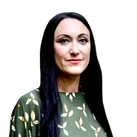Married At First Sight: Are we all doomed when it comes to finding ‘true love’?
If strangers have as much chance as the rest of us, perhaps there isn’t a ‘formula’ for romance

What does getting married mean to you? For some, it's a white dress and a chance to throw a big party. For others, it's a private commitment to someone they love. For a tragic and unfortunate number, marriage can be forced, arranged, unhappy.
A wedding can also be as much about convenience and practicality as it is about romance – currently in the UK, unmarried couples do not have the same rights to financial support for children, and do not automatically inherit when there is no will. And marriage can be as important to those who fought for it and campaigned for the right to do it, as it is inconsequential and irrelevant to those who have simply never had the urge or the funds - for an average wedding in the UK is now said to cost as much as £24,700.
It's not just our motives that are different, but our rituals, too. I've been to humanist weddings where the father-of-the-bride played The Kinks on the electric guitar; and to Orthodox Jewish ceremonies where the bride and groom had never even held hands before standing at the altar. I've witnessed couples tie the knot in churches, pubs and in fields. I personally walked down the aisle in black and white, to AC/DC. At weddings, now more than ever, anything goes.
Yet we, the un-shockable, were collectively shocked nonetheless by new reality TV show Married at First Sight, which seeks to wed scientifically-compatible couples who have never actually met. 2.1m of us tuned in on before hiding behind gleeful screens and schadenfreude-laden Twitter hashtags as we watched Jason and Kate lock eyes for the very first time, moments before slipping rings on each other's fingers; and we openly despaired whether James and Emma would ever truly be happy.
We are, it seems, obsessed with the idea of an elixir for love. In recent months we've seen tests with a specific series of 36 questions claiming to 'make someone fall in love with you'; and a supposed formula for contentment - but what are the real odds for happiness? To gamble on relationships, any relationship, when we never really know what goes on behind closed doors, makes losers of us all.
Perhaps the eight couples taking part in the controversial series have a better chance of making it than anyone, after undergoing months of rigorous psychological profiling, personality and IQ testing to assess their compatibility. The foundation for those relationships could certainly be considered more concrete than a slurred “I love you” after one too many wines or whiskeys; or a hasty proposal in the heady flush of first romance.
“Human beings are complex,” an anthropologist involved with the show admitted, holding up her hands as if to say, “the rest is up to them”. And she's right - the rest is up to them, and up to us. For despite tests, horoscopes, charms and equations that claim otherwise, the fact is that there are no real predictions for desire; no solid odds for making love last. Once the cameras are off for the eight couples taking part in the show, they'll have to live with their decisions, just like everyone else. I, for one, am championing their chances of success, and I’ll be sad if, like anyone else, they succumb to failure. For the odds are, however clichéd, that it's better to have loved and lost (even on reality TV) than it is to have never tried to love at all.

Join our commenting forum
Join thought-provoking conversations, follow other Independent readers and see their replies